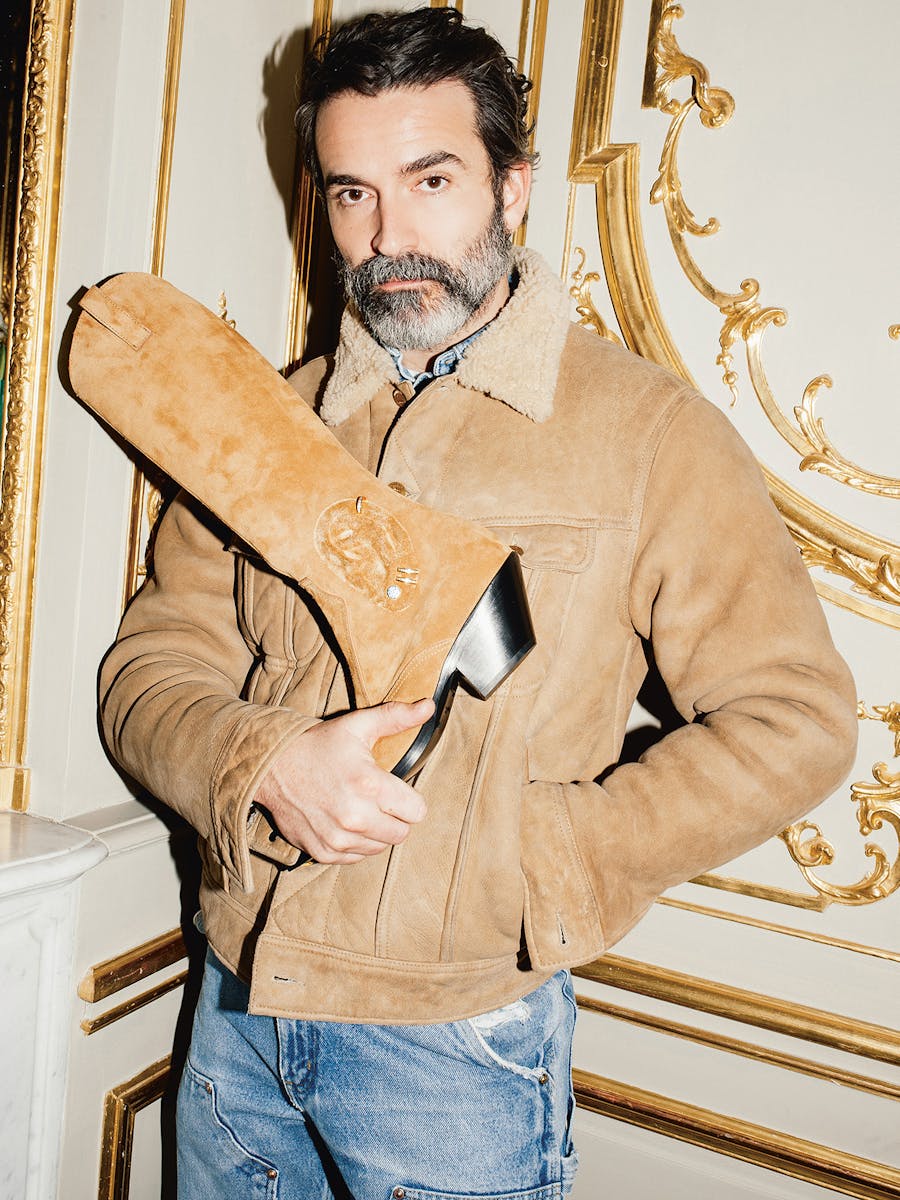How can I explain?
⏤ Grégoire constructed his identity almost in opposition to Léon but Grégoire is the product of Léon and, as life progresses, it is increasingly clear that they are of common stock. Léon Chertok, Grégoire’s father, was a psychiatrist and psychoanalyst before he reintroduced and reestablished the science and practice of hypnosis in France, thus becoming a pariah in the eyes of the psychiatric establishment of the 1970s. Grégoire is a partner at Rothschild. At the age of 53, he is one of the most sought after bankers in France. His links with artists and his love of creativity are equalled only by his attentive and methodical respect for the tenets of his profession. His speciality: mergers and acquisitions, and consultancy services.
⏤ If we qualify him as a (young) guru, he smiles, strokes his rather dapper beard and says, in his youthful, deep voice, “there’s no secret to it, apart from working hard.”
When, at the age of 20, Grégoire told his father that upon leaving university he planned to go into finance, Léon frowned and opined that nothing could be worse. “’I don’t understand’, he said to me. ‘You’re going into a profession where nothing is researched. Research is the essence of life. And,’ he added, ‘How did the apple fall so far from the tree?’” At that point Grégoire smiled at his father and replied, calmly, “All I know is that nothing can grow in the shadow of an oak.” An amazing scene. Foundational. With his propensity for deals and dialogue, strategy and counsel, his talent for analysis and methodical mind, Grégoire Chertok has gone on to become one of the most respected figures in French finance. His father, who passed away in 1991, would never see his success. He would never know how much his passion for observing other human beings nurtured his son and provided him with his greatest assets.
Since then, Grégoire Chertok has never ceased to pay homage to Léon, whose commitment to his work, and his research, meant he was often absent from everyday family life. Grégoire even dedicated his Légion d’Honneur to him. It’s exciting and moving to listen to Grégoire tell the romantic tale of Léon’s life. With methodical precision - and a fair bit of poetry - the son tells the story of the father, evoking a connection which he did not really feel as an adolescent, but which he knows has left a deep and abiding imprint on him and his sisters. “My father was born in 1911 in Lida, a village which is today in Belarus, but at the time was fought over by Poland and the Russian Empire. With a quota imposed on Jewish students in Poland, my father left for Prague and then for Vienna, between 1930 and 1938, to pursue his studies in medicine. And then, faced with the arrival of the Nazis, he had to flee. He didn’t have a visa for the US, so he stopped in France and fought for the French in a regiment of Polish emigrés.” Then came the armistice – but not for Léon. The battle was not over. Vanquishing Nazism and fighting against fascism were both a major part of Grégoire’s father’s life. “My father didn’t want to go to England. He hung up his uniform and enlisted in the FTP-MOI. Not as a combatant, which he always deeply regretted, but in contacts and recruitment, especially in the medical sphere. He was a character, that’s for sure. A dandy, an elegant, very handsome man. In 1938, as the zloty wasn’t convertible, he bought himself an entire wardrobe before going to France. Suits, tail coats, and even shirts monogrammed LCZ – Léon CZERTOK, as his name was spelt then…He was surely the most elegant member of the Resistance and that allowed him to move around freely. He was so committed to elegance he even kept his monogrammed shirts because one of his nom de guerre was Claude Zéphyrin Louvat. He spoke eight languages – and all of them very well.”
Grégoire Chertok’s father went on to serve with distinction during the war, winning the médaille militaire. But he also ran a network which helped Jewish children escape to a small protestant village in Deux-Sèvres. “In the end’, his son adds, ‘he did participate in the liberation of Lyon, alongside the FFI – he was even on the barricades next to Bertrand Tavernier’s father”. In 1947, he became a naturalized French citizen and took up a new struggle. He dedicated himself to psychiatry and, in the 1950s, undertook training analysis with Lacan. In theory he was going to become a psychoanalyst, but no - it was hypnosis that fascinated him. “What my father was interested in was what Freud had abandoned in developing psychoanalysis – he reinvented it, re-established it and, with difficulty, consolidated it in France. It was a science he came to when he was working on painless childbirth.” In the 1970s and 1960s, Léon Chertok achieved a series of spectacular cures with amnesiacs who recovered their memory and people suffering multiple traumatic injuries who learnt to walk again… and he did so in a few sessions. “You can imagine the reaction of psychoanalysts who had spent ten or fifteen years with patients – they stood to lose money. My father then worked with philosophers, sociologists and historians of science. His work revolutionized a lot of things. But the Société Psychanalytique de Paris refused to recognize him.”
Not necessarily surprising, therefore, that Léon Chertok wanted to call his autobiography Memoirs of a Heretic. He was romantic and, in many ways, admirable. As is the relationship between father and son, both past and present. The precision and the intense focus with which Grégoire speaks of his father underlines the fact that all of this nourished him and made him into who he is, including all the ways in which he is completely different. “I am permanently involved in an attempt to understand otherness. But I am also very methodical. When I started out in finance, I tried asset management, then the trading floor, then the corporate sector. I understood that it was there I was going to be happiest. There are three stages in mergers and acquisitions. There is a very precise technique which involves knowing a little about a lot [he never kids himself, Grégoire, that’s one of his rules for maintaining balance]. Then there’s negotiation, the pleasure of the deal. Finally, with the people you’re advising, with whom you’re working on an acquisition which will be decisive, there’s the human aspect. We talk about a wider range of subjects: the project, associates, competitors, the government, human resources. You’re still just an adviser, don’t get any big ideas about it - but you’re more involved and that’s very exciting.” And there we have it – we’ve come full circle: if the son has succeeded - and is still succeeding – it’s because he is of the same stock as his father, which has given him a pronounced preference for forging relationships with other people – patients or clients, associates or rivals
I met Grégoire Chertok through one of his oldest friends, Edouard Baer. “You can’t succeed in your profession without having other interests in life,” Grégoire says. “Artists have to think differently about existential questions.” He has this wonderful saying: “You need that, because banking is a profession which puts you in the red, psychologically.” From Vichy to today’s rampant populisms, he forgets nothing and is actively involved in everything and should catastrophe arrive, “I won’t be going anywhere. You have to stay and fight. Leaving is letting them win.” And then, his children are of capital importance. He is very present. There is also his passion for cinema, any kind of cinema, including the classics. And his passion for literature – he is, after all, in a relationship with the very talented Anne Berest. Grégoire Chertok smiles, understatedly and elegantly, about all his good fortune. But he strokes his beard once more as he recollects: “My father was born into a world which has disappeared. His language, his culture, his village, all destroyed by the violence of history. I have few family graves to visit and little in the way of heirlooms. I am a first generation Frenchman, in some way. I have to construct roots. I am like a recent convert. So grateful to France, so attached to the Republic, to secularism.”
All of this is said with the same calm voice, in the same even tone. We would like to see them again, Grégoire Chertok and Anne Berest. Since we don’t have any mergers and acquisitions to discuss, we’ll suggest a trip to the cinema. It’ll be great. We’ll leave it up to Grégoire to choose the film (and maybe Anne has a suggestion?…)
Translated into English by Sara & Emma Bielecki.


